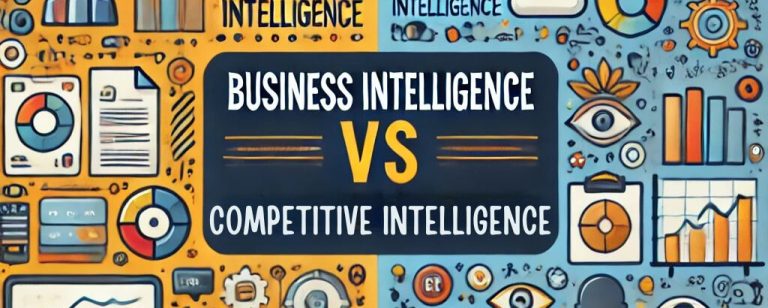Business intelligence and competitive intelligence differ in their focus, data sources, and end goals. Both make use of data for decision-making purposes, but business intelligence is more concerned with the analysis of internal data for improving business processes, while competitive intelligence is concerned with the gathering and analysis of external data to understand the competitive landscape. In the ensuing report, we’ve discussed these two concepts in such a way that highlights their main differences, definitions, benefits, and practical applications.
What is Business Intelligence?
Business Intelligence describes tools, technologies, and best practices for gathering, assimilating, analyzing, and presenting business data toward informing organizational decision-making. Often using internal sources of information (such as financial transactions, sales records, and customer lists), BI systems measure historical performance and look for opportunities for improvement in operational efficiency, or the way things should be done.
The objective of BI is to provide business leaders with accurate and actionable insights into their organization’s performance. BI tools allow for data visualization, reporting, dashboards, and analytics that give a comprehensive view of business operations, enabling companies to make data-driven decisions.
Business intelligence has drastically evolved over the past couple of decades. The early stages of BI systems were static and involved extensive manual reporting. Today, BI systems are equipped with the latest technologies like AI and ML, which produce predictive insights. They also automate data analysis processes. Further, it’s no longer limited to only big enterprises; it now offers access to small and medium-sized businesses through cloud-based platforms.
The Role of Business Intelligence
At its core, business intelligence is about using data to improve decision-making processes. By analyzing internal data, BI helps organizations:
- Understanding historical data analysis can help understand past performance.
- Predictive analytics will be able to forecast future trends and behaviors.
- Real-time monitoring of business processes and metrics
- Identify inefficiencies and bottlenecks to optimize operations
- Provide data-backed insights for strategic decision-making.
Benefits of Using Business Intelligence
Using business intelligence brings several advantages to an organization, including:
- Improved Decision-Making: BI equips executives and managers with up-to-date, accurate data, thereby making better decisions.
- Increased Efficiency: BI tools automate the analysis of data, thus saving time and reducing errors.
- Cost Reduction: It helps in the reduction of operational costs of the business through the identification of inefficiencies.
- Enhanced Customer Understanding: BI through customer data analysis helps in understanding customer needs, behavior, and preferences.
- Competitive Advantage: It helps in gaining a competitive advantage through early identification of market trends.
What is Competitive Intelligence?
Competitive Intelligence (CI) refers to the process of gathering information about external factors that can affect a business’s competitive position in the market and analyzing it. In other words, whereas business intelligence focuses on internal data primarily, competitive intelligence collects information from various external sources like competitors, market trends, industry reports, and so forth, all of which are publicly available.
Competitive intelligence is designed to give business organizations an all-inclusive understanding of their competitors’ strategies, market movements, and possible threats. Thus, an organization’s awareness of the external competitive landscape will give it proactive room to better position itself or avoid a risk.
CI relies on a wide range of sources, including:
- Publicly available data (financial reports, press releases, social media).
- Market research and surveys.
- Patent filings, trade shows, and conferences.
- Web scraping and online monitoring tools.
CI can be both strategic and tactical. Strategic CI helps with long-term planning and market positioning, while tactical CI focuses on short-term competitive threats and opportunities.
The Role of Competitive Intelligence
Competitive intelligence helps businesses navigate the competitive landscape. It involves:
- Identifying the strengths, weaknesses, and strategies of the competitors.
- Knowing the market trends, the emerging technologies, and how the industry changes.
- Monitoring the market and possible risks.
- Supports strategic decisions based on product development, price, and market entry.
Benefits of Using Competitive Intelligence
Competitive intelligence offers several key benefits to businesses, including:
- Risk Management: Companies avoid dangers by keeping themselves updated with the activities of competitors.
- Market Forecasting: CI enables businesses to prepare for market changes and preferences among customers.
- Better Product Development: CI offers information regarding competing products, which is also helpful in developing business.
- Strategic Planning: Business management can plan its strategies better if it understands the competitive environment, leading to differentiation.
- Innovations: Competitive intelligence tends to uncover new technologies or market trends, thereby allowing innovation in the business.
Difference Between Competitive Intelligence and Business Intelligence
The data focus of business intelligence differs from the application of competitive intelligence. Two types of intelligence are present in modern business: business and competitive intelligence, which differ significantly both in approach and objectives. Business intelligence and competitive intelligence are complementary roles for the success of an organization, though each plays a different role. BI seeks to optimize business operations based on internal data, whereas CI helps understand the general market context as well as future competitive challenges.
| Feature | Business Intelligence | Competitive Intelligence |
|---|---|---|
| Data Focus | Primarily internal data (sales, financials, operations) | External data (competitors, market trends, industry reports) |
| Goal | Improve internal decision-making and optimize operations | Gain insights into competitors and market environment |
| Scope | Gain insights into competitors and the market environment | Focus on the competitive landscape and market movements |
| Data Sources | Internal databases, ERP systems, CRM software | Competitors’ data, market research, public records, and news |
| Time Frame | Historical and predictive insights | Primarily future-oriented (competitive threats, market disruptions) |
| Use in Decision-Making | Used for operational, financial, and strategic decisions within the organization | Used for competitive positioning and market strategy |
| Tools Used | BI tools, analytics platforms, data warehouses | Web scraping tools, market reports, industry news, competitor analysis tools |
What is the Role of Business Intelligence in Decision-Making?
Business intelligence is the most critical component in decision-making, providing accurate, real-time data insights that inform strategic and operational choices. Organizations use BI tools to gather historical and predictive data, analyze trends, and forecast potential future scenarios. This enables decision-makers to:
- Track and analyze KPIs (Key Performance Indicators).
- Make data-backed adjustments to sales strategies and marketing campaigns.
- Adjust supply chain logistics based on inventory analysis.
- Manage and optimize customer relations using customer data insights.
Business intelligence plays an important role in decision-making for sustaining operational efficiency and aligning business goals with the market. Organizations use BI systems to maintain clear visibility of areas like sales performance, production timelines, and customer engagement, all of which are important aspects of informed decision-making.
Business Intelligence vs Competitive Intelligence FAQs
What is the difference between business intelligence and competitive intelligence?
The difference between business intelligence and competitive intelligence lies in their focus. Business intelligence analyzes internal data for business operations optimization, while competitive intelligence gathers external data to understand competitors and market trends.
What are the benefits of business intelligence?
Business intelligence improves decision-making, increases operational efficiency, reduces costs, and provides a competitive advantage by offering insights into business operations and customer behavior.
What is competitive intelligence?
Competitive intelligence involves collecting and analyzing external data about competitors, market trends, and the business environment to gain insights and make informed strategic decisions.
How does competitive intelligence help in decision-making?
Competitive intelligence helps businesses anticipate market changes, track competitor moves, and identify emerging threats, ultimately aiding in better strategic decision-making.
How can business intelligence improve business processes?
Business intelligence improves processes by analyzing internal data to uncover inefficiencies, optimize operations, predict future trends, and enhance overall business performance.


